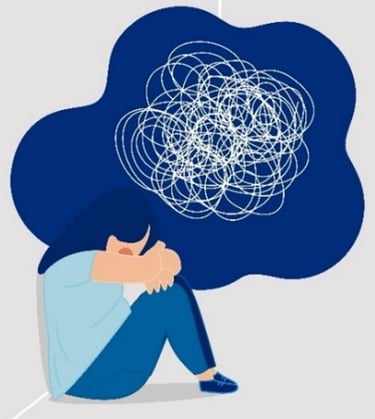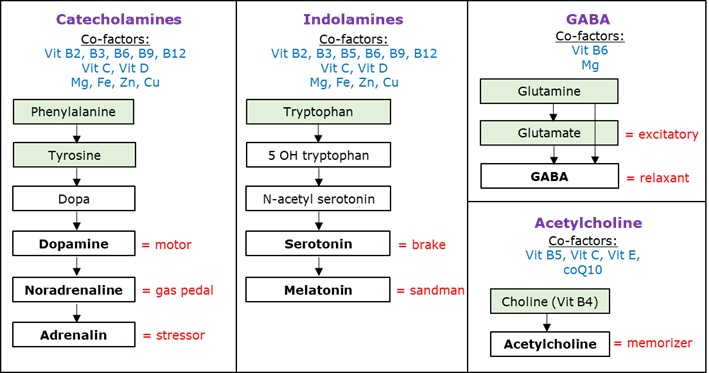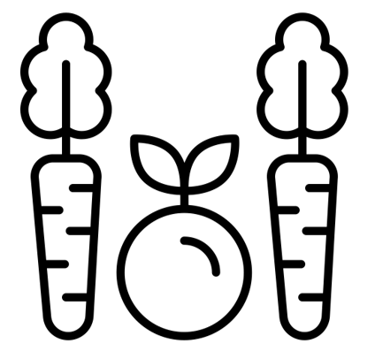Anxiety, depression, and diet


Anxiety and depression can be linked to diet,
especially via the amino acids that are the precursors of our neurotransmitters, the other nutrients that are cofactors in the synthesis of these neurotransmitters, and the omega 3 fatty acids EPA and DHA, which increase the fluidity of neuronal membranes. Another important link is intestinal inflammation, which has repercussions for the brain. Of course, chronic stress is also involved, and has a direct effect on neurotransmitters. Let's take a closer look:
Neurotransmitters influence our emotions, attention span and perception, as well as our ability to judge situations and make the right decisions. They also influence hormone production by stimulating or moderating the hypothalamus. That's how important they are! There are three main groups of neurotransmitters (for simplicity's sake, as there are others): catecholamines, indolamines and GABA. They are derived from amino acids, transformed via processes such as methylation and with the help of enzymes. All this requires certain vitamins and minerals. We can add acetylcholine, which is not derived from an amino acid, but from choline, a nutrient akin to a B vitamin. Here's a little diagram to visualize all this:
Without going into detail, we can think of catecholamines as our motors, indolamines as our "brakes", GABA as our relaxant and acetylcholine as our "memorizer".
It is possible to run out of neurotransmitters, notably because we lack the raw material needed to synthesize them. Another possible cause of neurotransmitter deficiency is a problem of intestinal health! In fact, a significant proportion of our neurotransmitters are produced by our intestinal bacteria. To find out whether we're lacking in neurotransmitters, we can use symptom-focused questionnaires (easily found online), combined with blood, urine and saliva tests. I won't bore you with the details here. These dosages do not necessarily reflect the use of neurotransmitters in the brain, but they give an indication.
When a person is in a cycle of anxiety and depression, which can happen for a variety of reasons (e.g., overwork, chronic stress, poor diet), they are in one of three consecutive phases. If we can identify the phase we’re in, we can try to intervene as best by adapting our diet and/or taking appropriate supplements. Of course, psychotherapy, physical exercise, and techniques such as meditation also have an important role to play.
In the first phase, the person is nervous. He or she may feel stressed and/or anxious. What must be avoided is the depletion of indolamines and GABA, to preserve the braking effect of serotonin and the relaxing effect of GABA. The synthesis of these neurotransmitters can be supported by a diet rich in amino acid tryptophan, the precursor of serotonin; vitamin B3, to prevent the body from using tryptophan for vitamin B3 synthesis to the detriment of serotonin synthesis; vitamin B6, cofactor in the synthesis of both serotonin and GABA; magnesium, also a cofactor in the synthesis of these neurotransmitters; amino acid taurine, which protects the brain from excess glutamate and binds to GABA receptors to enhance its relaxing effect; omega 3 DHA, to stimulate the production of neurons and the fluidity of their membranes; vitamins B9 and B12, which enable melatonin synthesis by methylation of serotonin, to promote recovery through sleep.
In the second phase, the person is excited. He or she sleeps little without necessarily feeling tired and tends to be hyperactive. He or she is attracted by sugar (the brains are highly active and need a lot of glucose), highly attentive, motivated, and imaginative, and can be very emotional. Indeed, serotonin's braking action on the impulsive behavioral response linked to noradrenaline and dopamine is almost non-existent, given that the indolamines are depleted. One needs to try to restore them by supporting their synthesis with a diet rich in the above-mentioned nutrients, and, under medical supervision, add lithium, which promotes the passage of tryptophan to the brain.
In the third phase, the person feels a sudden exhaustion and is knocked out, because of all his or her neurotransmitters drying up. The brakes are gone, but so is the gas pedal. The person has memory and concentration issues, and suffers from psychomotor slowdown, hypersomnia (wanting to sleep all the time, even during the day) and psychic fatigue. One needs to support the synthesis of both indolamines and catecholamines, with the same nutrients as those listed above, plus omega 3 EPA, also beneficial to neurons and amino acids phenylalanine and tyrosine, precursors of dopamine and noradrenaline.
There are also certain deficiencies to watch out for. It has been shown that the risk of depression is increased in cases of cholesterol deficiency (diet too low in lipids), ferritin deficiency (lack of iron or nutritional factors enabling its transport and absorption) and vitamin D deficiency.
Concerning inflammation, I refer you to my article on the gut-brain axis.
To summarize, adopting a healthy diet, optimizing it, regular physical activity, stress management and psychotherapy seem to be the winning combination for recovering from depression, while avoiding the risks and side-effects of the drug approach. The only exception is in the case of people with suicidal impulses: antipsychotic medication is justified in their case, with close management of the associated risks.
To find out more, also read these articles:
On the gut-brain axis: https://isabellemaesnutrition.com/en/gut-brain
On intestinal microbiota: https://isabellemaesnutrition.com/en/microbiota
Drawing above © PidcoArt/stock.adobe.com


